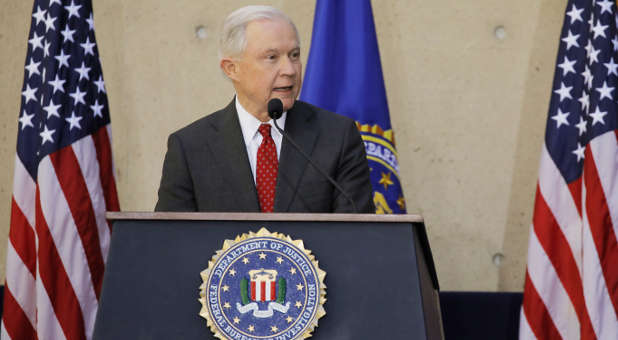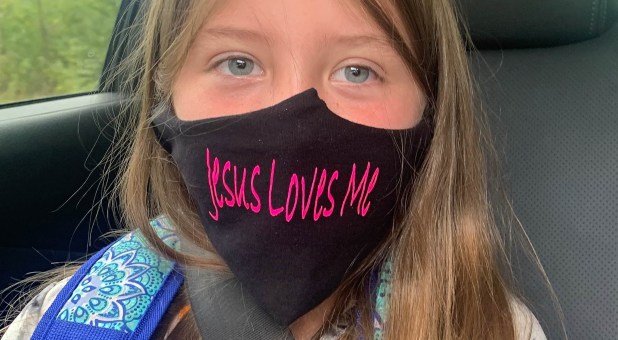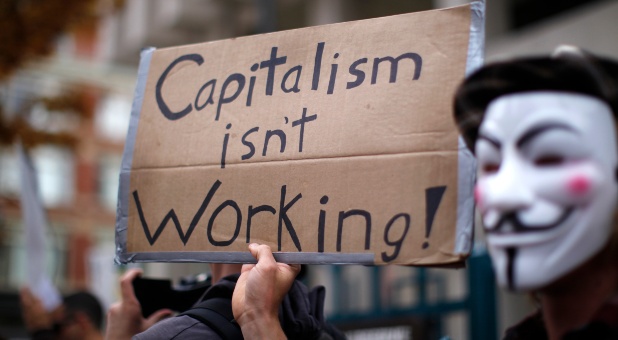The Trump administration strongly protected the free exercise of religion by reversing Obama-era policies with new legal guidance issued to the Department of Justice (DOJ) by Attorney General Jeff Sessions.
The Attorney General issued two memoranda. The first addressed to all administrative agencies and executive departments, identifies 20 key principles of religious liberty.
The guidance reminds agencies of their obligations under federal law to protect religious liberty, and summarizes 20 key principles of religious-liberty protections that agencies can use in that effort. It explains that agencies should use these principles to protect religious liberty in all aspects of their work, including as employers, rule-makers, adjudicators, contract- and grant-makers and program administrators.
On specific policies, the guidance states that government may not exclude religious organizations from secular aid programs, and the IRS may not enforce the Johnson Amendment, which restricts tax-exempt organizations, including churches and religious organizations, from endorsing or opposing candidates for elected office.
Attorney Sessions’ second memorandum, addressed to DOJ components and United States Attorney’s offices, directs the implementation of that guidance within the Department.
The 20 key principles are:
1. The freedom of religion is a fundamental right of paramount importance, expressly protected by federal law.
2. The free exercise of religion includes the right to act or abstain from action in accordance with one’s religious beliefs.
3. The freedom of religion extends to persons and organizations.
4. Americans do not give up their freedom of religion by participating in the marketplace, partaking of the public square, or interacting with government.
5. Government may not restrict acts or abstentions because of the beliefs they display.
6. Government may not target religious individuals or entities for special disabilities based on their religion.
7. Government may not target religious individuals or entities through discriminatory enforcement of neutral, generally applicable laws.
8. Government may not officially favor or disfavor particular religious groups.
9. Government may not interfere with the autonomy of a religious organization.
10. The Religious Freedom Restoration Act of 1993 prohibits the federal government from substantially burdening any aspect of religious observance or practice, unless imposition of that burden on a particular religious adherent satisfies strict scrutiny.
11. RFRA’s protection extends not just to individuals, but also to organizations, associations and at least some for-profit corporations.
12. RFRA does not permit the federal government to second-guess the reasonableness of a religious belief.
13. A governmental action substantially burdens an exercise of religion under RFRA if it bans an aspect of an adherent’s religious observance or practice, compels an act inconsistent with that observance or practice or substantially pressures the adherent to modify such observance or practice.
14. The strict scrutiny standard applicable to RFRA is exceptionally demanding.
15. RFRA applies even where a religious adherent seeks an exemption from a legal obligation requiring the adherent to confer benefits on third parties.
16. Title VII of the Civil Rights Act of 1964, as amended, prohibits covered employers from discriminating against individuals on the basis of their religion.
17. Title VIl’s protection extends to discrimination on the basis of religious observance or practice as well as belief, unless the employer cannot reasonably accommodate such observance or practice without undue hardship on the business.
18. The Clinton Guidelines on Religious Exercise and Religious Expression in the Federal Workplace provide useful examples for private employers of reasonable accommodations for religious observance and practice in the workplace.
19. Religious employers are entitled to employ only persons whose beliefs and conduct are consistent with the employers’ religious precepts.
20. As a general matter, the federal government may not condition receipt of a federal grant or contract on the effective relinquishment of a religious organization’s exemptions or attributes of its religious character.
The DOJ earlier this year demonstrated a shift in policy from the Obama administration as it commented on Zarda v. Altitude Express at the U.S. Federal Court of Appeals, which contends that Title VII of the Civil Rights Act of 1964 bans gender discrimination, but does not include sexual orientation or gender identity, in the workplace. The guidance today demonstrates further that the DOJ recognizes that religious liberty principles are in fact stalwart even when challenged by special interest groups.
“We commend President Trump for instructing Attorney General Jeff Sessions to send a strong message to the rest of America that religious freedom must be protected,” said Mat Staver, Founder and Chairman of Liberty Counsel. “The president has reversed the Obama-era policies and is committed to protecting and promoting the religious freedom upon which this nation was founded.
The Department of Justice must now vigorously enforce all Americans’ civil right of free exercise of religious liberty. This is an extremely positive step in the right direction.” {eoa}
For the original article, visit lc.org.
See an error in this article?
To contact us or to submit an article





















